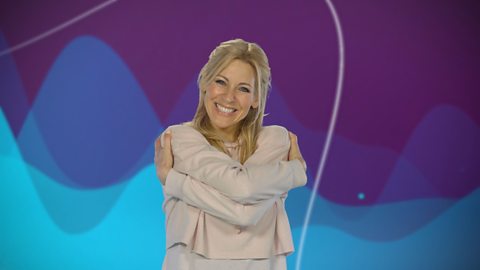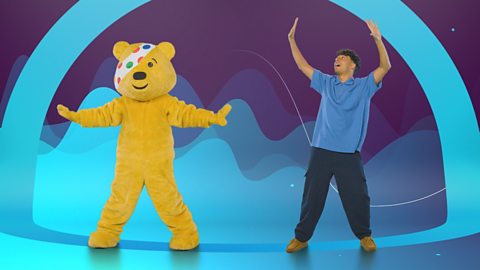Karim Zeroual:
Hey, Super Movers, everything ischanging all the time
Change is inevitable
From nature and the weather to all theanimals in the world
Including you and me
Let's learn some more about it
♫ We're born, we change
We learn, we grow
Evolving, transforming
Learning we know
We crawl, we cry, we learn to stand
We grow and learn with guiding hands
Everything's changing
This is how it goes
Now we're really flowing withthe change away we go
Change his life
Life is change
Changes in life are not so strange
Rising with the oceans, moving on to something new
Change is life, its a part of me and you
Dogs were puppiesand cats were kittens
Meeooww
And tadpoles will be frogsand chicks will be chickens
Pokpaaark
We are all part of change, look at everycreature
From your friends and family
And even your teacher
So you might be afraidand some change can be scary
But with people to help,we won't feel as wary
Don't be afraid embrace the day
Get help with all this, it will be OK
Everything's changing
This is how it goes
Now we're really flowing with thechange, away we go
Change is life
Life is change
Changes in life are not so strange
Rising with the oceans, moving on to something new
Change is life
It's a part of me and you
We go to school
We learn new things
We change our class
We learn to swim
Our world changes with every day
So we embrace that change
It's all OK
Change is life, life is change
Changes in life are not so strange
Rising with the oceans, movingon to something new
Change is life it's a part of me and you
That's right
Are you with me?
Change is life, it's a part of me and you
Come on, let's go
Change is life
It's a part of me and you ♫
Karim Zeroual and Southampton mascot Sammy Saint perform this heartening Super Mood Movers song about how change is a part of life.
After viewing, singing and dancing along, your class could try some of the following activities to further explore their learning.
This can be an emotionally challenging topic, particularly for children in difficult circumstances, so you may wish to address some activities only in small groups (or with individuals) after discussion with the headteacher.
Activities
- Life cycles: Using information books or online sources, pupils could draw 'wheel of life' diagrams to illustrate the life cycles of different living things: an apple tree, a butterfly, a frog, a bird, a rabbit.
- How I've grown: Ask - 'Are you the same now as you were when you were one? What is different about you?' Pupils could draw 'before' and 'after' pictures to show themselves at different ages (learning to walk, riding a bike, learning to swim, getting certificates, becoming an older brother or sister) and arrange them as a personal time-line.
- Stages of life: Write this list on the blackboard or whiteboard: 'baby, toddler, child, teenager, adult, senior citizen'. Ask: 'How are people different at different stages of their lives? How would you describe them? What do they do differently?' Gather pupils' suggestions to annotate your list with notes.
- At what age?: Ask the class some 'What age?' questions, such as: 'At what age does someone start school?' or 'At what age is someone an adult?', 'How old do you have to be to drive?' and 'At what age do you leave school?' Encourage pupils to write 'What age?' questions of their own. Establish that for some of these questions there are very specific answers which we can find (e.g. by looking online) but for others, there's no clear answer: people grow and change at different rates.
- Moving on: On the board write: 'moving home'. Ask pupils to describe what happens when people move home: they pack their things in boxes and suitcases, they load things on a van, they lock up the old home and drive away. They arrive at the new home, they unlock the door, they carry in all their things, they unpack them at the other end, perhaps they decorate the new home, they unpack. Ask children to mime these activities and then describe the feelings people might have as they carry them out. Establish that 'moving on' can produce a range of emotions. Some changes can seem scary, but our friends, family and teachers are here to help us with big changes in life.
- Moving on in stories: Begin with: 'As well as moving home, people move on in other ways. Can you think of any?' Pupils might suggest people may move to a new area, move class, move school, move to a new country, move into a new family, move job, or move to a new stage of life (such as marriage or retirement). Ask pupils to search story-books for examples of people moving on. They could share what they find by reading extracts of these books to a group or to the whole class. Ask: 'How does that character feel when they move on?'
- Remembering: Ask pupils to find and sketch examples of community memorials in their neighbourhood. A wall plaque, for example, that records when a public building was opened, or a statue that marks a notable contribution to the community. Ask: 'Why is it important to remember these things?' And 'How do we remember the special people and places in our own lives?' Pupils might suggest family photographs and souvenirs or perhaps family stories about funny things that happened, or big moments in family life.
- Saying hello: Ask - 'How do people welcome a new life into the world?' Pupils could research the naming traditions followed by people of different faiths and secular traditions such as baby showers and baby books. They could also discuss the tradition of birthday parties, gifts, candles and cakes as a way of marking the moment. Why do the pupils think these traditions are so important to us?
- Change poem: To sum up this work, give pupils the opening lines of a poem and ask them to write the rest of the verse: 'When we learn to change, we learn to live. / Change is life - it's transformative.'
Learning aims or objectives
The Super Mood Movers song Change Is Life and these activity notes address the following learning objectives from the curriculum guidance of the four UK nations.
England, PHSE and RSE
From the PSHE Association programme of study:
- H26. about growing and changing from young to old and how people’s needs change.
- H27. about preparing to move to a new class/year group.
- H23. about change and loss, including death, and how these can affect feelings; ways … managing grief and bereavement.
- H24. problem-solving strategies for dealing with… change, including the transition to new schools.
- H31. about the physical and emotional changes that happen.
- H33. about the processes of reproduction and birth as part of the human life cycle; how babies need to be cared for.
- H35. about the new opportunities and responsibilities that increasing independence may bring,
- H36. strategies to manage transitions between classes and key stages.
From the RSE guidance:
- Families and people who care for me:
- That families are important for children growing up because they can give love, security and stability; the characteristics of healthy family life, commitment to each other, including in times of difficulty, protection and care for children and other family members.
- The importance of spending time together and sharing each other’s lives; that stable, caring relationships, which may be of different types, are at the heart of happy families, and are important for children’s security as they grow up.
- That marriage represents a formal and legally recognised commitment of two people to each other which is intended to be lifelong; how to seek help or advice from others if needed.
- Caring friendships:
- How important friendships are in making us feel happy and secure; the characteristics of friendships, including support with problems and difficulties.
- Mental Wellbeing:
- That there is a normal range of emotions (e.g. happiness, sadness, anger, fear, surprise, nervousness) and scale of emotions that all humans experience in relation to different experiences and situations.
- How to recognise and talk about their emotions, including having a varied vocabulary of words to use when talking about their own and others’ feelings; that it is very important for children to discuss their feelings with an adult and seek support.
- Where and how to seek support (including recognising the triggers for seeking support), including whom in school they should speak to if they are worried about their own or someone else’s mental wellbeing or ability to control their emotions.
Northern Ireland, PD&MU
From the Northern Ireland curriculum for Personal Development and Mutual Understanding:
- Self-awareness (Strands 1 and 2):
- Their self-esteem, selfconfidence and how they develop as individuals.
- Develop self-awareness, self-respect and self-esteem.
- Face problems, trying to resolve and learn from them.
- Recognise how responsibilities change as they become older and more independent.
- Feelings and emotions (Strand 1):
- Their management of a range of feelings and emotions and the feelings and emotions of others.
- Examine and explore their own and others’ feelings and emotions.
- Know how to recognise, express and manage feelings in a positive and safe way.
- Recognise that feelings may change at times of change and loss.
- Health, growth and change (Strand 1):
- How to sustain their health, growth and wellbeing.
- Recognise what shapes positive mental health.
- Know how the body grows and develops.
- Know how babies … grow and are born.
- Know how the body grows and develops.
- Recognise how responsibilities change as they become older and more independent.
- Relationships (Strand 2):
- Find out about sources of help and support for individuals, families and groups.
Scotland, PSE
From the Education Scotland Personal and Social Education benchmarks:
- First level health and wellbeing:
- Recognise that we have similarities and differences but are all unique (HWB1-47a).
- I am aware of my growing body (HWB1-47b).
- I know who I should talk to if I am worried (HWB 1-49).
- Second level health and wellbeing;
- I am identifying and practising skills to manage changing relationships and I understand the positive impact this can have on my emotional wellbeing (HWB 2-45a).
- I recognise that how my body changes can affect how I feel about myself and how I may behave (HWB 2-47a).
- I am able to describe how human life begins and how a baby is born (HWB 2-50a).
From the Curriculum for Excellence Health and Wellbeing Experiences and Outcomes:
- Mental and emotional wellbeing:
- I am aware of and able to express my feelings and am developing the ability to talk about them (HWB 1-01a / HWB 2-01a).
- I know that we all experience a variety of thoughts and emotions that affect how we feel and behave and I am learning ways of managing them (HWB 1-02a / HWB 2-02a).
- I understand that there are people I can talk to and that there are a number of ways in which I can gain access to practical and emotional support to help me and others in a range of circumstances, (HWB 1-03a / HWB 2-03a).
- I understand the importance of mental wellbeing and that this can be fostered and strengthened through personal coping skills and positive relationships. I know that it is not always possible to enjoy good mental health and that if this happens there is support available (HWB 1-06a / HWB 2-06a).
- I am learning skills and strategies which will support me in challenging times, particularly in relation to change and loss (HWB 1-07a / HWB 2-07a).
- Planning for choices and changes: …to prepare for the next stage in my life and learning (HWB 2-19a).
Wales, PSE
From the Personal and Social Education Framework for 7 to 19-year-olds in Wales:
- Active citizenship: to value families and friends as a source of mutual support.
- Health and emotional well-being: take increasing responsibility for keeping the mind and body safe and healthy; feel positive about themselves and be sensitive towards the feelings of others; the reasons for the physical and emotional changes which take place at puberty, to include conception, pregnancy and birth; the range of their own and others’ feelings and emotions; what to do or to whom to go when feeling unhappy or unsafe.

More from Super Mood Movers:
Wellbeing. video
Naomi Wilkinson performs this comforting Super Mood Movers song about taking care of our mental wellbeing.

Rights and respect. video
Rhys Stephenson performs this stirring Super Mood Movers song about respecting ourselves and others.

Look after yourself. video
Pudsey and Karim Zeroual perform this catchy Super Mood Movers song about looking after yourself and taking on new challenges.

Giving something back. video
Sammy Saint and Billy Badger perform this memorable Super Mood Movers song about coming together and giving something back.

We are citizens! video
Rhys Stephenson performs this lively Super Mood Movers song about being good citizens.
